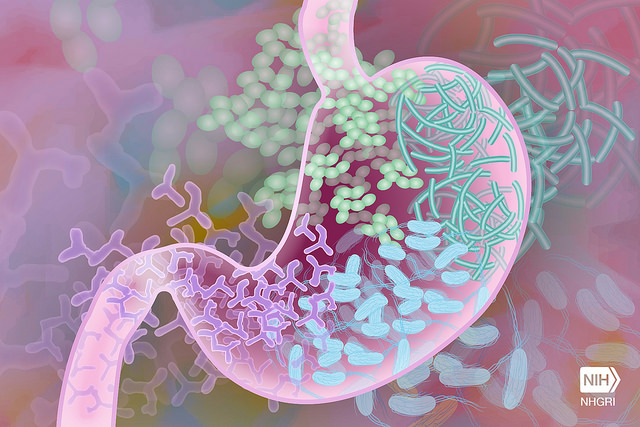
It is well recognized that people who work night shifts, or who travel across time zones frequently, are more likely to become overweight or to suffer from gut inflammation. There has been considerable research aimed at trying to understand the underlying mechanisms that link the brain’s circadian clock, which acts in response to the daylight cycle, with physiological processes.
Studies in mice by researchers at the Champalimaud Centre for the Unknown in Lisbon, have now discovered that the functioning of a group of immune cells known to be strong contributors to gut health is directly controlled by the brain’s circadian clock, and that this may at least in part explain the link between sleep patterns and gut inflammatory responses. “Sleep deprivation, or altered sleep habits, can have dramatic health consequences, resulting in a range of diseases that frequently have an immune component, such as bowel inflammatory conditions,” said research lead Henrique Veiga-Fernandes, PhD. “To understand why this happens, we started by asking whether immune cells in the gut are influenced by the circadian clock.” The team reported its findings in Nature, in a paper titled, “Light-entrained and brain-tuned circadian circuits regulate ILC3s and gut homeostasis.”
Nearly all body cells have genetic mechanisms for following the circadian rhythm. These “clock genes” do act as their informal name suggests, and effectively inform cells of the time of day, which helps organs and body systems keep to the daily rhythm and anticipate time of day-related events, such as when it’s time to eat or to sleep. “Circadian rhythms rely on local and systemic cues to coordinate mammalian physiology and are genetically encoded by molecular clocks that allow organisms to anticipate and adapt to extrinsic environmental change,” the investigators stated.
Cell clocks are autonomous, but they still need to be synchronized to make sure that “everyone is on the same page.” As Veiga-Fernandes explained, “The cells inside the body don’t have direct information about external light, which means that individual cell clocks can be off. The job of the brain’s clock, which receives direct information about daylight, is to synchronize all of these little clocks inside the body so that all systems are in synch, which is absolutely crucial for our wellbeing.”
Type 3 innate lymphoid cells (ILC3s) are a key type of immune cell in the intestine. “These cells fulfill important functions in the gut: they fight infection, control the integrity of the gut epithelium, and instruct lipid absorption,” commented Veiga-Fernandes. This type of immune system cell has also been shown to interact with neuronal cells, hinting at the possibility that ILC3 function may be affected by changes in circadian rhythms. “ILC3s have been shown to be part of discrete mucosal neuroimmune cell units,” the authors stated, “raising the hypothesis that ILC3s may also integrate systemic neuroimmune circuits to regulate tissue integrity and organismic homeostasis.”
The team’s tests in mice showed that ILC3s were particularly susceptible to having their clock genes disrupted, whereas other types of immune cell in the intestine weren’t greatly affected. “When we disrupted their clocks, we found that the number of ILC3s in the gut was significantly reduced, Veiga-Fernandes continued. “This resulted in severe inflammation, breaching of the gut barrier, and increased fat accumulation.”
Further studies indicated that disruption to the brain’s circadian clock influenced the gene expression in ILC3s, and the cells lost what the team describes as “postcode receptors.” The tests showed that, to be able to localize to the intestine, ILC3s needed to express these cell surface postcode receptors, which acted as tags to instruct the ILC3s—which are transient residents in the gut—where to migrate. Without the brain’s circadian inputs, ILC3s failed to express the tag, which affected their localization.
“We found that light cues are major extrinsic entraining cues of ILC3 circadian rhythms, and surgically or genetically induced deregulation of brain rhythmicity resulted in altered ILC3 regulation,” the researchers noted. “In turn, the ILC3-intrinsic circadian machinery controlled the gut receptor postcode of ILC3s, shaping enteric ILC3s and host homeostasis.”
Veiga-Fernandes said the results are particularly exciting because they clarify why gut health might become compromised in individuals who are routinely active during the night. “This mechanism is a beautiful example of evolutionary adaptation,” he commented. “During the day’s active period, which is when you feed, the brain’s circadian clock reduces the activity of ILC3s in order to promote healthy lipid metabolism. But then, the gut could be damaged during feeding. So after the feeding period is over, the brain’s circadian clock instructs ILC3s to come back into the gut, where they are now needed to fight against invaders and promote regeneration of the epithelium.”
“It comes as no surprise then,” Veiga-Fernandes continued, “that people who work at night can suffer from inflammatory intestinal disorders. It has all to do with the fact that this specific neuroimmune axis is so well regulated by the brain’s clock that any changes in our habits have an immediate impact on these important, ancient immune cells.”
“Notably, the regulation of ILC3 activity by systemic circadian circuits may have evolved to maximize metabolic homeostasis, gut defense and efficient symbiosis with commensal organisms that have been evolutionary partners of mammals,” the authors concluded. “ … our current data may also contribute to a better understanding of how circadian disruptions in humans are associated with metabolic diseases, bowel inflammatory conditions, and cancer.”
The new results add to previous discoveries by the Veiga-Fernandes lab linking the immune and nervous systems. “The concept that the nervous system can coordinate the function of the immune system is entirely novel,” he noted. “It has been a very inspiring journey; the more we learn about this link, the more we understand how important it is for our wellbeing and we are looking forward to seeing what we will find next.”











